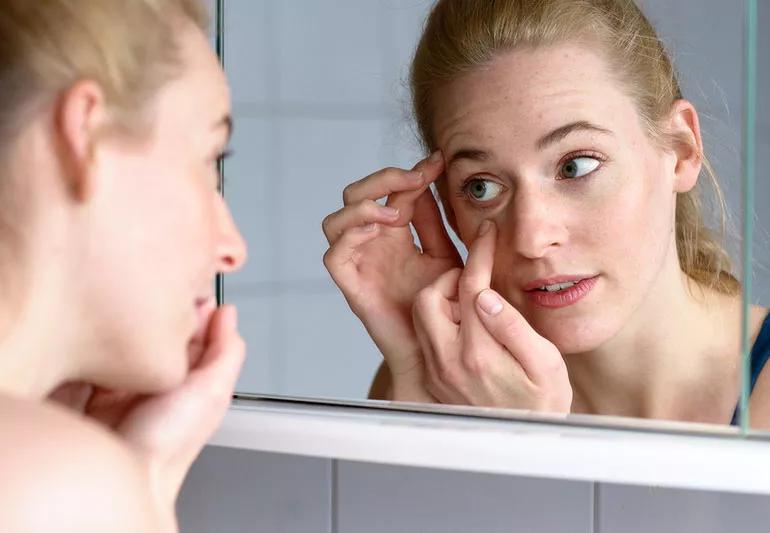8 reasons for swelling and when to seek help

Do your eyes look puffy or swollen? When fluid builds up in the thin layers of tissue surrounding your eyes, your eyes and eyelids can swell. But when is it cause for concern?
Advertisement
Cleveland Clinic is a non-profit academic medical center. Advertising on our site helps support our mission. We do not endorse non-Cleveland Clinic products or services. Policy
Typically, eye swelling in your upper or lower eyelid is just an uncomfortable annoyance that will go away on its own within a day. But if the swelling lasts longer, it’s important to treat it because some problems can quickly damage your eyes.
“Any swelling that lasts longer than 24 to 48 hours should send you to an eye care professional because there are times it can be something severe that can blind you,” says ophthalmologist Annapurna Singh, MD.
There are several reasons why you might see swelling in your eyes or eyelids. They include:
Allergies – This is a common problem that is also the simplest to treat. These can be due to hay fever or a reaction to foods, chemicals or other irritants.
Conjunctivitis – Also known as pink eye, this infection is common during cold and flu season. It’s often caused by a virus, bacteria, allergens or other irritants.
Stye – An infection in an eyelash follicle or tear gland, styes appears as tender, red bumps at the edge of your eyelids.
Chalazion – Similar to a stye, a chalazion is a harmless, small bump that appears on your eyelid. Blocked oil glands cause chalazia.
Orbital cellulitis – This inflammation, which spreads from your sinuses, occurs more often in children than in adults. It causes redness and painful swelling of your eyelid and the skin surrounding your eyes.
Advertisement
Trauma-related injuries – When blunt force strikes, your eye compresses and retracts, causing blood to gather underneath the damaged area. This often causes swelling and discoloration.
Graves disease – Also known as thyroid eye disease, Graves disease is an autoimmune condition that causes inflammation of your eye. It relates to a thyroid problem.
Eye cancer – This is rarely the reason for swelling in or around your eyes. However, it is a symptom. Eye cancer, or an eye lymphoma, is also accompanied by blurred vision or loss of vision. You may also see floaters — spots or squiggles — slowly moving in your field of vision.
Most swelling around the eyes goes away within a few days. Here are a few tips to help reduce swelling in the meantime:
Call your eye doctor right away if swelling lasts longer than 24 to 48 hours and you notice any of the following:
To ensure that your eyes remain healthy, regular eye exams are a good idea — whether or not you’ve experienced swelling in your eyes, Dr. Singh says.
“One of the reasons to have regular eye exams is to check for glaucoma, which can slowly damage the optic nerve – and for an early cataract, which clouds the lens in the eye and also affects your vision,” she says.
An eye exam can also reveal signs of systemic diseases, including:
If you are under the age of 40, Dr. Singh recommends seeing an eye doctor every four or five years. After age 40, see your eye doctor every two or three years. Anyone who is age 50 or older should visit their eye doctor once a year, she says
“If you follow these guidelines, your eye doctor can help to discover conditions that you might otherwise miss,” she says.
Advertisement
Learn more about our editorial process.
Advertisement

Most recommended precautions center around minimizing bruising or swelling

Even one drink can have an impact on your cognitive function leading to slurred speech, blurred vision and impaired memory

Understand who may (and may not) benefit

Lorem ipsum dolor sit amet. Et odio Quis vel ipsam omnis eum alias deleniti et placeat impedit non voluptas galisum hic autem enim et cupiditate aliquid. Est beatae quidem non facilis autem ut commodi nisi aut tempore rerum et dolores voluptatem cum enim optio id sapiente quasi. Ad laboriosam officiis 33 cupiditate sequi ea voluptatum consectetur qui necessitatibus voluptate et quasi doloremque et facere explicabo quo explicabo officia

Seeking help through therapy can be an important step in improving your quality of life when you have UC

Type 2 diabetes isn’t inevitable with these dietary changes

Applying a hot or cold compress can help with pain